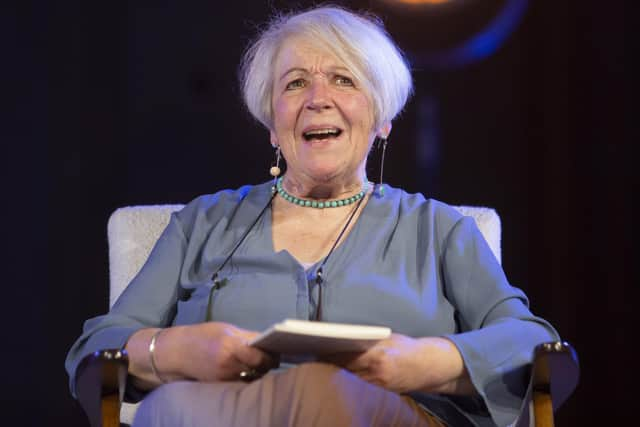Book review: A Handsel – New and Collected Poems, by Liz Lochhead
In ye olde days, poetry publication had a kind of logical trajectory that was filled with ambiguities. Poets usually started off with periodical publication, until they could send a manuscript to a publisher. It would help to have pamphlets or chapbooks to bolster a budding reputation. A first collection might be lauded or sink without trace, the hope always being it would not do so badly as to nix the idea of a second collection. Eventually there might be a Selected Poems; a taster in some ways and a mark of recognition in others. Finally, suitably laurel-wreathed, there is the Collected Poems. There are problems at every turn. Some poets – WH Auden was notorious for this – use the Selected and the Collected to revise and alter the earlier poems. Sometimes styles change markedly: indeed, I have met poets who utterly disavow their first works, one even claiming to buy second hand copies of their debut in order to burn them. And there is the problem of longevity. I have Edwin Morgan’s Collected Poems and several books he had not yet written when the Collected was collected.
So what is the function of a Collected? It is, to a degree, still curated, although titling this volume “A Handsel” is a typical Lochhead piece of wit. A handsel is a New Year’s gift or a token to commemorate the beginning of a venture, thought to bring good luck. This effectively stymies the notion of this being a gravestone of a book. That is why it is important that it includes intact the collections from Memo For Spring (1972) to Fugitive Colours (2016). I have not compared it to 2011’s A Choosing: Selected Poems, but its title raised the idea there was more than one possible selection, as well as nodding at a poem from her first collection, “The Choosing”. But how an author chooses and arranges their work is of consequence. It can be left to future academics to hazard chronologies and compile a Complete, with every verse scrap from cards, off-the-cuff squibs, unpublished works, and fugitive pieces from school magazines, dedicated copies and suchlike. (I am not joking: Emily Dickinson’s These Gorgeous Nothings, the poems she wrote on envelopes, is a treasured possession).
Advertisement
Hide AdA Collected Poems of Liz Lochhead is important for two reasons. Firstly, it is a mark of cultural self-confidence. Rattling off awards and honours is small beer compared to publishing a book – hardback, 464 pages – that says “this is what we think of as being of value in our culture”. They don’t do that for the poets who shout their brains on TikTok or Instagram or whatever these days. Secondly, it is a kind of retrospective – appropriately for a book so interested in visual arts. Where, over 50 years, are the continuities and the divergences, the fault lines and the ley-lines? Which techniques are used for which specific effects? It allows for a deeper appreciation of Lochhead’s oeuvre to date.


The first surprise is that, although I think of Lochhead as a Scots language poet as much as a poet who happens to be from Scotland, Scots only takes up a small part of this – indeed there are nopoems in Scots in her earliest collection. They have, in their timbre, lilt and camber a “Scottishness” but there is no MacDiarmid style dictionary-troubling. Scots is used more frequently in later books, but it is usually either in monologue-based works (these are the words this character would use) or for comedic effect. The shades of Chic Murray, Rikki Fulton and even Harry Lauder are there. She uses it to brilliant effect in “From Beyond the Grave”, a caustic poem in Standard Habbie on the #MeToo Burns.
Lochhead has always moved between the mytho-poetic and the social realist, often in each case, subverting expectations. It is noticeable that Grimm Sisters (1981) predates Carol Ann Duffy’s The World’s Wife by some 18 years. Over all of this the kind of guardian angel is Edwin Morgan, and there are several poems to and about him. In terms of freedom – freeness of verse, freedom to discuss sexuality and politics, freedom to write in whatever vocabulary set you wish – he has been an admirable mentor. A poem like “Vymura”, where artist’s names replace the names of paint colours, has a sheer joy in language as much as anything.
If I can say one thing to persuade you to buy this, go into an independent bookshop and read “The Space Between” then part with some money. It blends the all-too real – seeing a relative in lockdown – with the archetypal – the hand paintings on cave walls. Once you are home and can dip in and out, you will find other poems that chime with this: “Way Back in the Paleolithic”, “Homilies from Hospital” – and also take time to read or re-read “Bagpipe Muzak”, a poem from a time when pro-independence poetry had wit and joie de vivre.
A Handsel – New and Collected Poems, by Liz Lochhead, Polygon, £25